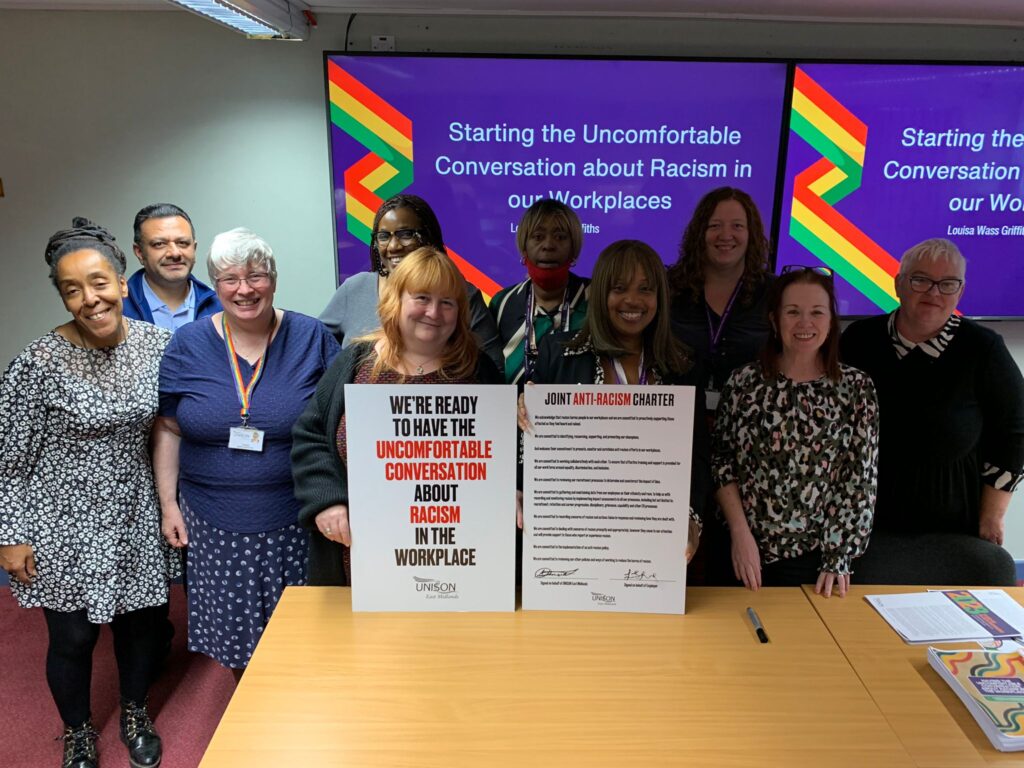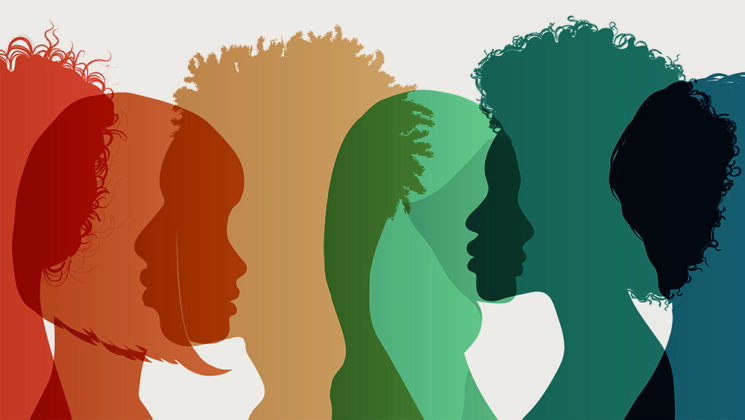UNISON East Midlands have launched a pioneering initiative to tackle racism with a new anti-racism charter and workplace champion programme.
Introducing the Charter

(East Midlands Probation Service were the very first employer to commit to the charter)
The Charter represents a joint commitment from UNISON and the Employer to Black workers in your workplace. It is the product of joint working between UNISON staff, activists and employers from across the East Midlands.
It is the first step of the road towards truly anti-racist workplaces, where Black workers are as safe, valued and respected as their white colleagues.
The Charter is intended to hold all parties accountable to a meaningful commitment to tackle workplace Racism in all the forms it takes in our workplaces and the working lives of Black workers.
The Charter underpins the role of Anti-Racism Champions, who will work alongside organisational leaders to challenge Racism internally and externally wherever it arises in relation to the organisation.
Downloadable Resources
UNISON’s Model Anti-Racism Policy
Having the Uncomfortable Conversation Workplace Guide
The role of the Anti-Racism Champions
1. UNISON will put forward an Anti–Racism Champion from the Branch. The Employer will put forward an Anti-Racism Champion.
2. Each pair of Champions will undergo training and have support from the Regional Group made up from other Anti-Racism Champions across the Region.
3. Each pair of Champions will oversee the introduction of effective ways of working to make sure concerns about Racism are dealt with appropriately, and will monitor concerns about Racism and action taken, providing reports to the joint negotiating body of the Employer.
4. Each pair of Champions will work collaboratively and proactively to suggest changes to practice, introduced through joint negotiating body of the employer, that will improve lives for Black workers. This may include but is not limited to reviews of recruitment, disciplinary, grievance, sickness and training policies and ways of working.
5. Each pair of Champions will be visible advocates for Anti-Racism in that Employer.
Joint Anti-Racism Charter
1. We acknowledge that Racism harms people in our workplaces and we are committed to proactively supporting those affected so they feel heard and valued.
2. We are committed to identifying, resourcing, supporting, and promoting our champions.
3. And welcome their commitment to promote, monitor and scrutinise anti-Racism efforts in our workplaces.
4. We are committed to working collaboratively with each other. To ensure that effective training and support is provided for all our workforce around equality, discrimination, and inclusion.
5. We are committed to reviewing our recruitment processes to determine and counteract the impact of bias.
6. We are committed to gathering and maintaining data from our employees on their ethnicity and race, to help us with recording and monitoring Racism by implementing impact assessments in all our processes, including but not limited to:
a. Recruitment, retention and career progression
b. Disciplinary, Grievance, Capability and other ER processes
7. We are committed to recording concerns of Racism and actions taken in response and reviewing how they are dealt with.
8. We are committed to dealing with concerns of Racism promptly and appropriately, however they come to our attention and will provide support to those who report or experience Racism.
9. We are committed to the implementation of an anti-Racism policy.
10. We are committed to reviewing our other policies and ways of working to reduce the harms of Racism.
Anti-Racism Training
Training will be sourced by UNISON to provide education to all Anti-Racism Champions in their role. This will include:
1. What is Racism and how are its effects felt in our Employers
2. Barriers to Change and how to Overcome them
3. Working together to inspire and activate our union or management colleagues around Racism; and generate confidence in workers to challenge Racism.
Once this is embedded, we will move to developing the second stage of our training for our whole workforce in that employer. This will include:
1. There is nobody racist here, or is there? Introduction to Racism and how to notice and make a difference.
2. What to do if you are experiencing or witnessing Racism?
3. Diving Deeper in Racism – unconscious bias, micro-aggressions, code swapping and privilege.
History
In June 2020, Black members in the East Midlands reported instances of being all called the ‘n-word’ by White service users and they were also threatened. Their White colleagues laughed at them and colluded with the racist and threatening behaviour.
The regional Black members committee undertook a lengthy period of consultation and surveying which uncovered the following:
- 29% of all respondents had witnessed Black colleagues experience Racism in the workplace
- 54% felt unable to challenge the discrimination they saw
- 64% of Black members who responded had experienced Racism directed towards them in the workplace
- 70% of Black members who have experienced Racism in the workplace have not raised the issue with their Branch

